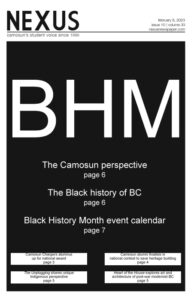Camosun College must take more concrete steps toward Indigenization if real change is going to happen. On its website, Camosun has its posted acknowledgement, which is a good reminder to respect the peoples who are allowing us to seek knowledge on their land. Having this territorial acknowledgement on its site is an important initial step in cultivating an environment where Indigenous peoples and their land are respected.
Camosun has attempted to integrate Indigenous peoples into the college since its opening. Camosun’s name change was surprisingly swift following its establishment in October 1970 as Juan de Fuca College. In January of the next year, the college changed its name to Camosun, a Lekwungen name meaning “where different waters meet and are transformed” (Camosun officially opened its doors to students on September 16, 1971). This quick change in name to honour Indigenous peoples was an important step in reconciliation, but it’s not enough.

Indigenization must take place cross-campus, not just in theory. My personal experience of territorial acknowledgements has varied significantly since my initial classes at Camosun. I’m in my second year here, and I’ve experienced a noticeable decline in acknowledgements at the beginning of each class.
In my first semester during my first year, all of my teachers said a territorial acknowledgement at the beginning of each class. The next semester, my professors said acknowledgements on the first day, then less and less until, by the end of the year, it wasn’t said at all. This year I’ve had a few teachers acknowledge the land we’re on, yet only on the first day, and as more of a by-the-way thing. After the first week, territorial acknowledgements were all but forgotten in my classes.
Camosun says on its site that “Across the college, the territorial acknowledgement has become part of our practice to honour, respect, and acknowledge relationships with First Nations and Indigenous peoples of this place.” This statement claims that the college uses territorial acknowledgements, yet there’s nothing in the statement about making sure they’re implemented.
If Camosun wanted to follow through with this claim it could start by having a mandatory territorial acknowledgement before every class. The college is vague enough in its initiative to implement “Indigenization” that there are next to no formal actions taking place to make this plan come to fruition.
I’m not saying that the college is deliberately being vague to avoid taking direct action. I’m just saying that if we made sure every single class started with a heartfelt territorial acknowledgement, that would be an extremely respectful catalyst in the fight for Indigenization in an educational and academic setting such as Camosun.
If the steps we’re going to take are clearly laid out, it’s easier to follow those steps on a path toward reconciliation. In general, it’s easier to implement actions if you know what exact initiatives are being put in place. Additionally, if students know what specific steps are being taken towards Indigenization, they will have the authority to recognize and take action when the plan isn’t being implemented.
Real change requires truth in where we’re currently at and concrete steps to implement individual change.
